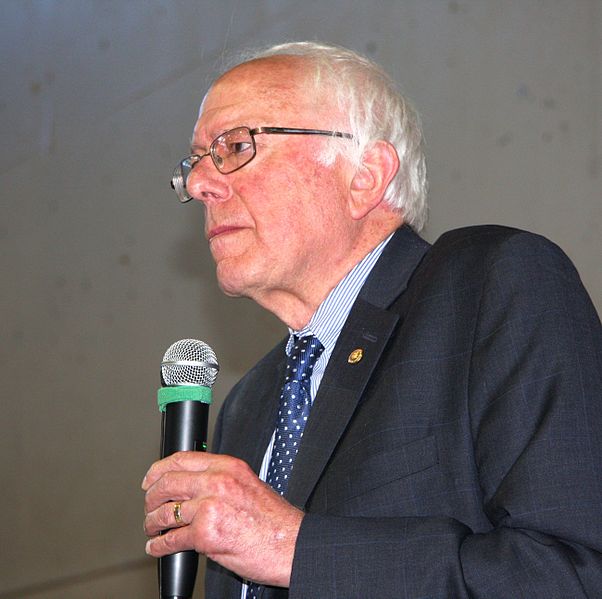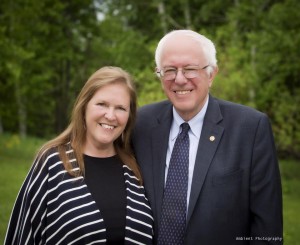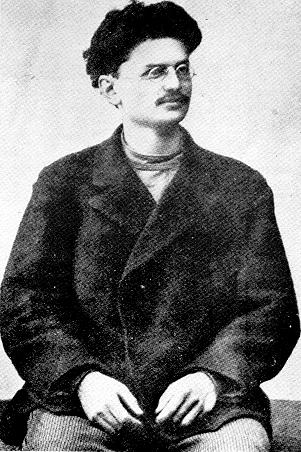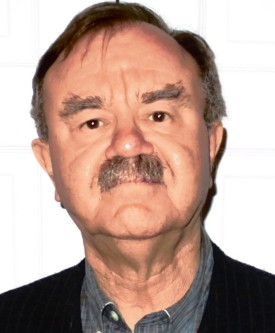
Bernie Sanders is the first Jew to mount a credible campaign for the White House.
Yet the American Jewish community has not rallied around him, nor has there been any Jewish groundswell of public pride. There are no calls for Jews to support their fellow Jew.
It’s because Sanders has almost nothing to do with the American Jewish community or its organizations and concerns.
Though his parents were European Jews — his father came to America at age 17 — and lived in the very Jewish milieu of Brooklyn, New York, a campaign ad describes Sanders simply as “the son of a Polish immigrant.”

He is married to Jane O’Meara, a non-Jewish woman. She was neither born Jewish, nor is she a convert to Judaism.
But Bernie Sanders is more than part of the growing category that Jewish demographers identify as “just Jewish.” He is a modern example of a specific historical type: what Isaac Deutscher, the biographer of the Soviet Communist Leon Trotsky (né Bronstein), referred to as the “non-Jewish Jew.”

These were people, like Rosa Luxemburg, Emma Goldman, and countless others, who became socialists, communists, and anarchists by fervently embracing “universalist” ideals, and leaving behind the “parochialism” of Judaism (and, of course, Zionism).
They defined themselves by their unconditional solidarity with the persecuted and oppressed.
Following in the footsteps of Jewish radicals from earlier eras, Sanders was caught up in the civil rights and anti-war movement of the 1960s.

While at the University of Chicago, Sanders joined radical student organizations like the Young People’s Socialist League and the Congress of Racial Equality.
After college, he was part of a mini-migration to Vermont of socially conscious urbanites going “back to the land.”
His political career in Vermont began with the Liberty Union Party, which grew out of the anti-war and civil rights movements of the 1960s.

Today, Sanders invokes his Jewish roots only in order to explain his passion for combating bigotry as he preaches his own secular brand of social justice gospel. Socialism, not Judaism, is his real religion.
At a rally last October, Sanders told his listeners that racism is a tool that politicians and the wealthy elite use to keep workers divided and to weaken their efforts to organize. By pitting black against white, men against women and straight against gay, “that’s how the rich got richer while everybody else was fighting each other.”
This is a speech that, with few modifications, could have been — and was — made by any number of Jewish communists 80 years ago.
Yet Gal Beckerman, a former opinion editor at the Forward, the New York left-of-center Jewish newspaper, suggested in a February 15 New York Times article that Sanders is actually representative of the direction the American Jewish community is headed.
“A majority of American Jews have tried hard to balance their liberalism with an identity that was also connected to tradition and religion, through Reform and Conservative Judaism, and an allegiance to Israel,” he writes. But a 2013 Pew Research Center survey “suggests that the socialist worldview is winning out.”
When asked what it means to be Jewish, 69 percent of respondents answered “leading an ethical life,” and 56 percent chose “working for justice and equality.” Only 19 percent said it had to do with “observing Jewish law.”
Reflexive support for Israel has also declined.
But this is “winning” by losing! All of these supposedly “socialist Jews,” with no connection to Judaism and Israel are, at most, one- or two-generation Jews. “Jewishness” for them is a cultural memory, at best, one that remains part of a childhood nostalgia revolving around food and song, and won’t be passed on.
Certainly their grandchildren most likely won’t be Jewish, as almost all of their children will have married non-Jews. (Given that Jews are only about two per cent of the U.S. population, that’s simple statistics, if marrying someone Jewish is not uppermost in their minds.) Sanders’ own biological son, Levi Sanders, born in 1969 to then girlfriend Susan Campbell Mott, isn’t Jewish.
Such people, like many before them through the centuries, can be filed under the label “l’origine juif,” as the French say. But without actual Jews, not simply those who were born Jewish, there can be no Judaism or a Jewish people.
Henry Srebrnik is a professor of political science at the University of Prince Edward Island.

